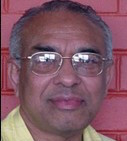A Brief Colonial History Of Ceylon(SriLanka)
Sri Lanka: One Island Two Nations
A Brief Colonial History Of Ceylon(SriLanka)
Sri Lanka: One Island Two Nations
(Full Story)
Search This Blog
Back to 500BC.
==========================
Thiranjala Weerasinghe sj.- One Island Two Nations
?????????????????????????????????????????????????Thursday, June 28, 2018
Embattled and demented president stifles even media of friends :sends CID to Thilanga’s and UNP managed newspapers !
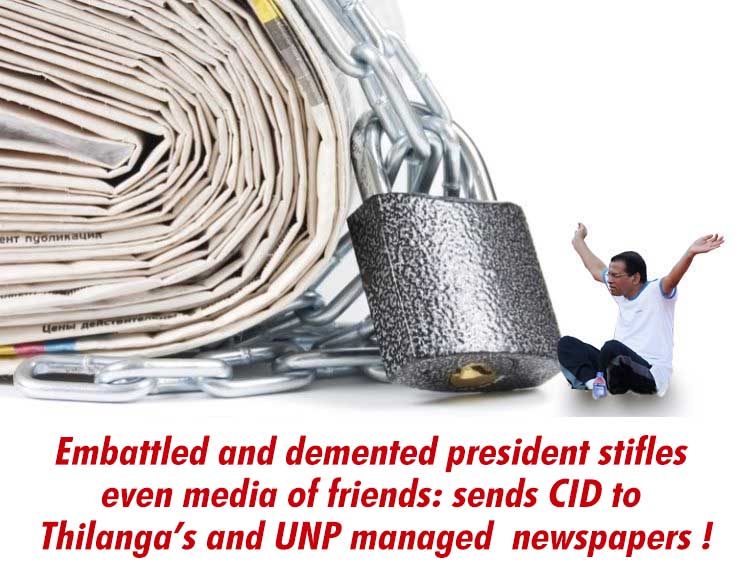
 (Lank
e News – 24.June.2018, 11.00PM) While the UNP which is the main
constituent party is asleep at the wheel , President Pallewatte Gamarala
on the other hand who started a vicious campaign against media freedom
by unlawfully blocking the media which criticize him as well as
proscribing and sealing such Institutions , has now extended that media
suppression against his friends too, based on reports .Gamarala has now
extended his media suppression to his bosom pal Thilanga Sumathipala’s
daily newspaper ‘ Lakbima’ , as well as to Dinamina the government
newspaper under the UNP administration .
(Lank
e News – 24.June.2018, 11.00PM) While the UNP which is the main
constituent party is asleep at the wheel , President Pallewatte Gamarala
on the other hand who started a vicious campaign against media freedom
by unlawfully blocking the media which criticize him as well as
proscribing and sealing such Institutions , has now extended that media
suppression against his friends too, based on reports .Gamarala has now
extended his media suppression to his bosom pal Thilanga Sumathipala’s
daily newspaper ‘ Lakbima’ , as well as to Dinamina the government
newspaper under the UNP administration .
Dinamina and Lakbima on 2018-05-25 published reports regarding the
celebration of heroes in May in the North and South. On the instructions
of Gamarala an investigation was commenced by the CID into the news
reports published. The news reports revealed the president and prime
minister have at the security council meeting given instructions to be
vigilant against activities in the North or South of an armed
insurgency aimed at dividing the country.
The president has taken offence because a security council matter was reported. .
According to CID sources , as this was something published in relation
to a matter discussed at the security council , it is being
investigated . Yet in the letters sent by the CID to the two newspapers
such a thing is not mentioned. In the letters under the signature of
A.H.Nuwan Asanka S.P of the CID to the newspapers a number of bizarre
questions have been asked.
Those questions are ..Who wrote the report? What are their addresses ? Who authorized them to publish ? ( the letter is hereunder)
These reports have revealed a state secret nor are they detrimental
to the country , and the names of the reporters in both Dinamina and
Lakbima had been revealed along with the reports. In the circumstances
searching for the private addresses of the journalists is unwarranted
and unnecessary. It is anybody’s knowledge that when a report is being
published it is done with the approval of the news editor and chief
editor ,and probing into who provided the information is irrelevant.
What is being searched without saying directly is , who is the
participant in the security council who passed the information to the
media. No journalist or editor is bound to reveal the source of
information.
A landmark judgment was delivered by chief magistrate Nishantha
Hapuarachi on 2009-12- 11 during the Rajapakse era in this connection in
respect of Lanka e News editor
In that case , the same CID aforementioned filed charges against the
editor on the grounds that the latter did not reveal the source of
information .The judge who heard the petition said , if such information
is to be disclosed , it will not be possible to carry on the
profession of journalism , therefore he confirmed there is a right to
refrain from revealing such information.
In the case the gazette notification No. 162 /SH dated 1981-10-14 which related to the laws was referred to.
(The crucial court decision which is not unlawful to be had in the
custody of every editor was destroyed when the Lanka e News portal was
set on fire. If any media personnel wants a copy thereof he/she may
contact Manjula Pathiraja and obtain it without any fuss)
In any event , Gamarala’s attempt to obtain the addresses of the
journalists is itself a clear threat to their security .Within the
government itself there had been discussions, why the good governance
president who came making loud announcements and promises that he would
safeguard media freedom and ensure the security of the journalists , is
questioning the media personnel who have not committed any offences.
‘Nanna Paul’ Gamarala leaving no stone unturned for another media suppression
Meanwhile cabinet spokesman Rajitha Senaratne made an announcement on the 20 th.
He said , there is information that there are 80 social media which are
causing embarrassment to the government and spreading mendacious reports
. Among them 40 are fomenting racial hatred while the other 40 are
hostile to the government . It has come to light it is a new party that
is behind these , and investigations have begun in that connection , he
added.
Lanka e News reported on 16 th June under the headline ‘Lanka‘s
media freedom fiend struggling to ban internet media ; orders
intelligence division to give list of those criticizing him !!’
While the government taking stern decisions against spreading of
falsehoods and racism is no issue , the grounds cited that ‘government
is being harassed ‘ and ‘anti government’ are utterly bogus. This
statement chanted by an authoritarian certainly is not in consonance
with Rajith Senaratne . Besides a party operating a social media is not
unlawful. If the president can grant rights to a ‘pet lackey’ of Kili
Maharaja to run a plethora of social media , the new party too should
have that right.
President Pallewatte Gamarala who is now precariously clinging on to a 4
% popularity base is now determined to stifle and suppress the media
which are justifiably castigating him , as a last straw nursing the hope
to field as a presidential candidate at the next elections.
It is a universally accepted fact, for any foolish ruler when he is in
his death throe to seek temporary relief by suppressing the media .If
Gamarala is choosing only that avenue and no other, let us forewarn , at
least the social media of Libya allowed Gadaffi to hide in the culvert
finally , but in the case of Gamarala , the social media of SL will not
spare even a culvert for him to hide.
(The relevant media reports and the letters sent by the CID to Lakbima and Dinamina are in the photographs herein).
---------------------------
by (2018-06-24 17:43:52)
by (2018-06-24 17:43:52)
Sifting Wheat from Chaff

 JUN 28 2018
JUN 28 2018IMF’s Sri Lanka Mission Head Manuela Goretti speaking to journalists in Colombo via a video conferencing facility from Washington, DC last Wednesday said that a flexible exchange rate (ER) is the first line of defence against inflation.
She also said the country’s foreign reserves were fragile, while expecting an automatic pricing formula (APF) for electricity.
However, Central Bank of Sri Lanka’s (CBSL’s) ER policy pursued immediately after that briefing has been contrary to Goretti’s advice.
CBSL, in order to shore up the rupee amidst depreciative pressure, since last Wednesday, has pumped US dollars from the country’s foreign reserves to the market.
As a result, the benchmark ‘spot’ has strengthened by between Rs 1.55 and 1.45 (0.97-0.91 per cent) in four market days, to have closed at Rs 158.40/60 to the dollar in two way quotes by Tuesday.
Yesterday was a holiday to the market on account of Poson Poya. ‘Spot’ trades are settled after two market days from the date of transaction.
A weak rupee causes inflationary pressure as Sri Lanka is an import dependent economy. CBSL’s writ is to ensure price and financial system stability. By ensuring a stable ER, CBSL aids price stability.
According to latest data, the country’s foreign reserves, year-on-year (YoY) as at the end of last month grew by 30 per cent (US$ 2,023.51 million) to $ 8,769.01 million, giving CBSL adequate room to defend the rupee.
Depreciative pressure on the rupee is caused by exporters holding on to their dollars on expectations that there is room for it to weaken ‘further’ due to the political uncertainty created after former President Mahinda Rajapaksa’s fledgling Sri Lanka Podujana Peramuna’s surprise landslide win at the 10 February Local Government polls.
Nonetheless, CBSL’s ER policy stance is a battle of wits between it and exporters. Exporters need rupees to meet their domestic commitments. In the absence of them converting their dollars to rupees to meet such commitments, they would have to resort to bank borrowings.
Another weapon that CBSL has to ‘induce’ exporter conversions is to raise rates. CBSL’s next rates decision is on 6 July. However, Goretti advised against raising rates as it may harm growth.
First quarter (1Q) growth, YoY decelerated from 3.8 to 3.2 per cent, while Q on Q it has stagnated at 3.2 per cent. Therefore, it’s unlikely that CBSL will raise rates, instead, opting to continue to defend the ER from its reserves, hoping that this will wear down exporters.
Last month, the Government backed down from an administered price regime for fuel, to an APF, centring round variables such as the ‘spot’ value and the world market price of crude.
IMF wants a similar mechanism adopted for electricity which prices too is currently administered.
However, hydroelectricity, the cheapest source of electricity, stayed in the positive growth terrain on a YoY basis for the eighth consecutive month to March, according to latest data.
As at last year, hydroelectricity unit cost to the CEB was Rs 2.77, whereas currently the electricity unit price charged to the consumer is seven times more at Rs 20.06.
In the1Q of the year, hydroelectric power generation grew by 87.6 per cent YoY to 650 gWh comprising 16.93 per cent of total electricity generated in the review period. The biggest generator was coal, comprising 39.81 per cent or 1,528 gWh, out of total electricity generated of 3,838 gWh, a 9.6 per cent YoY growth. As at last year, the cost of a ‘coal electricity’ unit was more than four times hydroelectricity, at Rs 9.74 a unit.
Nevertheless, considering that coal and hydroelectricity comprise more than 50 per cent of Sri Lanka’s total electricity requirements and also the fact that the ‘spot’ YoY has fallen by between Rs 5.07 and 5.20 (3.31-3.39 per cent), while Ceylon Petroleum Corporation’s crude oil import prices having had increased by $ 29.02 (56.17 per cent) to
$ 80.68 a barrel as at last month according to available data, it may be prudent for the Government to defer implementing an APF for electricity at this juncture, considering the fact its implementation would result in the price of an electricity unit increasing further, from the current ‘high’ levels of
Rs 20.06.
Wed, Jun 27, 2018, 01:00 am SL Time, ColomboPage News Desk, Sri Lanka.

 June
27, Colombo: The government of Sri Lanka has taken measures to uplift
the living conditions of the poor while achieving sustainable
development in urban areas, the Minister of Finance Mangala Samaraweera
said.
June
27, Colombo: The government of Sri Lanka has taken measures to uplift
the living conditions of the poor while achieving sustainable
development in urban areas, the Minister of Finance Mangala Samaraweera
said.Addressing the Third Annual Meeting of the Board of Governors' Business Roundtable of the Asian Infrastructure Investment Bank (AIIB) held on Monday (25) in Mumbai, India, Sri Lanka's Finance Minister highlighted that cities all over the world are adopting various measures to efficiently manage urbanization which paves the way for sustainable cities.
 |
"Therefore, I am of the view that the main focus of the concept of Sustainable Cities should be on serving the poorest segments of the society by providing better living and working conditions for them by ensuring affordable housing, health care, water, sanitation and electricity," he said.
In this context, Minister Samaraweera said the Government of Sri Lanka has accorded high priority to achieve sustainable development in urban areas, while taking various policy measures to uplift the living conditions of the poor.
"The theme of my National Budget Proposals for 2018 was 'Blue-Green Economy'. In this context, we recognized the inalienable relevance of ocean related economic potential of our country as an Island. We introduced sustainable development strategies that pave the way to achieve our Vision for 2025 that envisages a country enriched with a higher per-capita over USD 5000."
He said Sri Lanka has received a positive response from AIIB for the Urban Regeneration Programme which aims at relocating 50,000 low and lower middle-income households living in slums and shanties in Colombo City into new apartments.
The Minister noting that Sri Lanka, being an Island, hosts over hundred lagoons and estuaries said the government plans to develop these lagoons and expects the support of the AIIB.
"The environmental sustainability of those precious water bodies will ensure the wellbeing of many aquatic resources, therefore, we expect to implement a lagoon development project in the country for which the AIIB could become a strong partner in due course," he said.
On the sidelines of the meeting, Minister Samaraweera also had discussions with the Indian Minister of Finance, Railways and Coal, Piyush Goyal on the matters of mutual interest.
 |
 |
Meeting with the President of the Asian Infrastructure Investment Bank Jin Liqun the Minister said he discussed the projects which need to be finalized for this year and for year 2019.
External Threat Endangers Internal Reforms
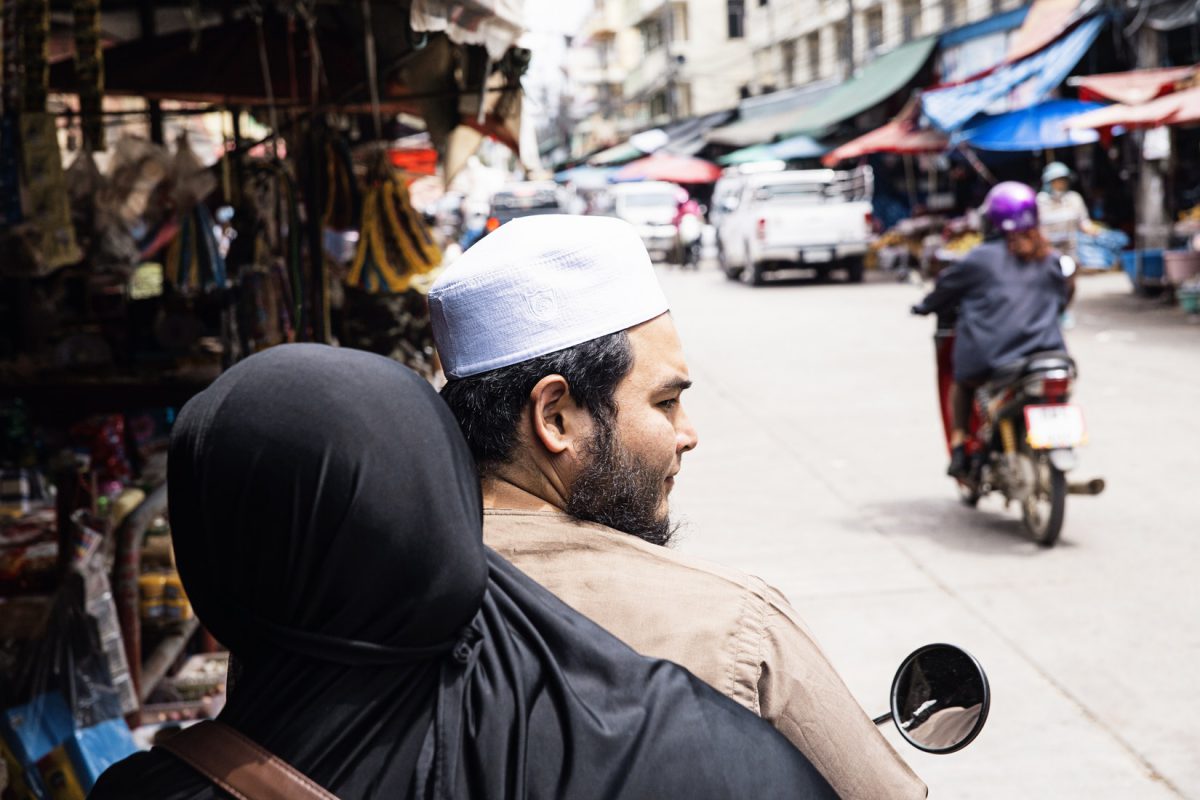
 “Global
Islamophobia has created a powerful means of isolating and demonising
Muslims worldwide, legitimizing stigmatization and discrimination by
reviving centuries-old caricatures of Islam as a violent and lascivious
religion and remodelling them for the post-Cold War era, placing Muslims
across the world on a spectrum linking them to ISIS and al-Qaida”~
(Jim Wolfreys, Republic of Islamophobia, London: Hurst & Company, 2018, p. 195)
“Global
Islamophobia has created a powerful means of isolating and demonising
Muslims worldwide, legitimizing stigmatization and discrimination by
reviving centuries-old caricatures of Islam as a violent and lascivious
religion and remodelling them for the post-Cold War era, placing Muslims
across the world on a spectrum linking them to ISIS and al-Qaida”~
(Jim Wolfreys, Republic of Islamophobia, London: Hurst & Company, 2018, p. 195)
In its search for a scapegoat to blame the failures of neoliberal
economics, industrialised nations, led by the US, found Islam a fitting
candidate, thanks to al-Qaida’s misadventure on 11 September 2001. Until
that infamy, protests against neoliberalism and its economic models
grew international and grew metamorphosed into a global
anti-globalization movement threatening not only the political stability
of Western democracies but also, more importantly, the economic
dominance of the US Empire. What
started as vocal protests against the IMF and World Bank meeting in
Berlin in 1988 gradually became bloodier culminating in the most violent
demonstration in 2001 when the Genoa Group of Eight met in that city in
July 2001. Naturally, world leaders panicked and were desperately
looking for a distraction to turn world’s attention and media focus away
from anti-globalization protests. To these leaders Bin Laden and his
al-Qaida was a manna from heaven. The so called War on Terror turned
Islam the new enemy and gave birth to global Islamophobia.
Global Islamophobia produced two diametrically opposed reactions from
the Muslim world. One was to counter this phenomenon in the most
militant way and strive to create several Islamic states if not a
universal Caliphate. Al-Qaida,
Boklo Haram, Jamaa Islamiyya, the Taliban and ISIS are some of the most
notable avatars of this militant Islamism. Their violence actually
provided a meaning and justification to an otherwise baseless War on
Terror. The other was a defensive stand by the majority of Muslims to
hold fast to the Islamic religious status quo. Holding on to religious
conservatism became the safest option when enemies of Islam are at the
gates. Between the War on Terror on the one hand and the two extreme
positions of the Muslim world on the other, reformists agitating for
change in the Islamic Weltanschauung became collateral victims. This
explains why it is hard to initiate reforms to bring about changers in
some of the religiously rigid rules and practices in the Muslim world.
Islam
did not face a reformation movement as Christianity did; but during the
twilight years of the Ottoman Empire several thinkers and activists
called for modernization which produced the Tanzimat reform movement in
the mid-nineteenth century. Unfortunately, religious modernization
proved difficult because of subsequent colonization of the Islamic world
by the West. What the West saw as a civilising mission, la mission civilisatrice, to Muslims it was a destroyer of their pristine religion and culture. Under
foreign domination and rule protection of what one already had took
priority over change in the face of imminent destruction. Also,
the term reform became detestable and a scaring phenomenon to the
traditional majority especially after Kamalism’s de-Islamisation of
Turkish polity and society in the name of reformation. In the second half of the 20th century
and after independence reforms became a political tool in the hands of
authoritarian regimes and dictators, who wanted to keep the reformists
in check without antagonising the conservatives. They were playing a
double game. In the wake of the War on Terror and global Islamophobia
Muslim reformists who are calling for an intellectual mind shift from
tradition to modernity have become heretics, atheists and black sheep to
the conservative majority. This is the dilemma the Muslim world faces today. Even incremental reforms have become too difficult to achieve.
Read More
SRI LANKA PROBATION DEPARTMENT AND NCPA PUSHING CHILDREN BACK INTO THE HANDS OF ABUSERS
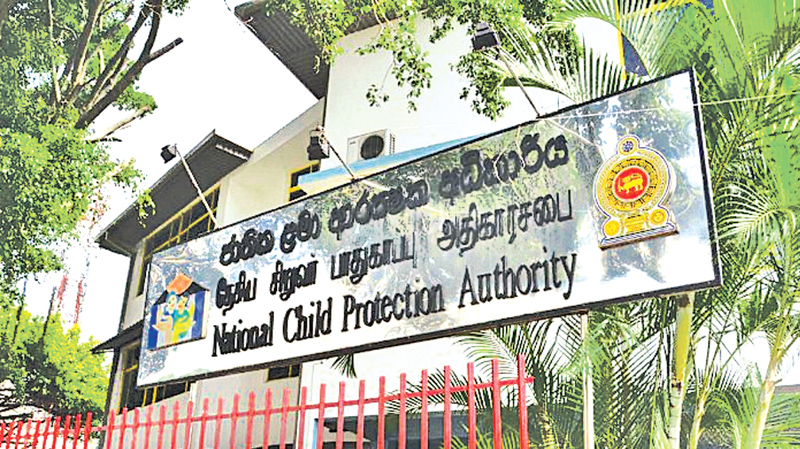
We the undersigned members of civil society condemn the actions of the Probation Department and the National Child Protection Authority (NCPA) for attempting to send children back to Darun Nusra, a children’s home where sexual abuses of children have taken place. We also condemn the State institutions for their inaction in finding suitable government schools for the affected children to continue their education
In June 2017, an anonymous phone call was made to the NCPA that sexual abuses were being committed on the children residing in Darun Nusra. During the police investigations it was revealed that a male staff of this home was allegedly committing these offences and both the Matron and the Coordinator of Al-Muslimaath the charity managing Darun Nusra were reported about these incidents but did not take action.
Despite ongoing investigations into the allegations of abuse, which not only include the alleged abuser but also the matron and the Coordinator of Al-Muslimaath, the Probation Department has vehemently opposed calls by activists for the children to be transferred out of Darun Nusra for their own safety.
Officers from the Probation Department have consistently engaged in victim blaming in Court by portraying the two main victims of abuse as mentally unsound. One of the first children to be transferred out of Darun Nusra due to Court orders was sent by the Probation Department to a home which the Probation Officers themselves later admitted in Court as unsanitary, lacking in running water, and unsuitable for children.
Further in March 2018, an NCPA report found Darun Nusra to be unsuitable for children to live in and the institution requested court to transfer the children out. However, in May 2018, the NCPA backtracked on this and sought to transfer some of the children back without explanation.
Furthermore, the Courts instructed the Probation Department and the NCPA to find suitable government schools for the children, yet for around three months both institutions have taken no concrete action. Instead, we are informed that at a meeting called by the NCPA with the guardians and Probation Officers in June 2018, the guardians were either pressured to take the children back home or return them to Darun Nusra if they want their education to continue. This raises many questions on why the State has been unwilling or unable to find suitable government schools in a country which has a tradition of providing free quality education. This also raises questions as to why the State continues to promote an organisation that is being investigated for allegations of child sexual abuse. As of today, the inefficiency of the Probation Department and NCPA has deprived these children of schooling for three months.
We condemn this negligent and callous attitude of the Probation Department and the NCPA for failing to provide justice for children who are economically and socially vulnerable – many of whom have suffered recent trauma. This entire incident would not have happened if the Probation Department which is tasked with monitoring children’s homes had mechanisms to identify child abuse occurring within institutions.
We condemn the Probation Commissioner of the Western Province, the Chairperson of the National Child Protection Authority, and the Secretary and the Minister of the Women and Child Affairs Ministry for not performing their roles responsibly. The conduct of the State institutions in this case also raises concerns about the welfare of other children in Probation Certified Homes who are under the overall care of these Institutions.
We the undersigned demand that the Probation Department, NCPA and the Ministry of Education work together to immediately find Government schools with an English medium curricula for the 13 children in this case. We demand that the two children having special educational needs be enrolled in a suitable educational institution. We also demand that the children transferred to a home located in Bandaragama, be relocated together immediately, as all parents who have visited it, have expressed deep dissatisfaction with the treatment of their children in this home.
Signed by:
1. Affected Women’s Forum (AWF), Akkaraipattu 2. Akshaya 3. Alliance Development Trust (ADT) 4. Association of War Affected Women (AWAW) 5. Centre for Policy Alternatives (CPA) 6. Human Rights Office (HRO), Kandy
7. INFORM Human Rights Documentation Centre 8. Lend A Hand Fund 9. Liberation Movement 10. Maatram Foundation 11. Mannar Women’s Development Federation (MWDF) 12. Mantra Life Centre 13. Mass Movement for Social Justice 14. Muslim Women’s Development Trust (MWDT) 15. National Christian Evangelical Alliance of Sri Lanka (NCEASL) 16. National Fisheries Solidarity Organization (NAFSO) 17. Nisha Development Centre, Mullaitivu 18. Organisation for Integrated Social Development (OISD), Kilinochchi 19. Right to Life (R2L) 20. S.J.V. Chelvanayakam Memorial Trust (CMT) 21. Sri Lanka Brief 22. The Grassrooted Trust 23. Vallamai Travellers, Jaffna 24. Women and Media Collective (WMC) 25. Women’s Action Network (WAN)
Thus Speaks the Judiciary
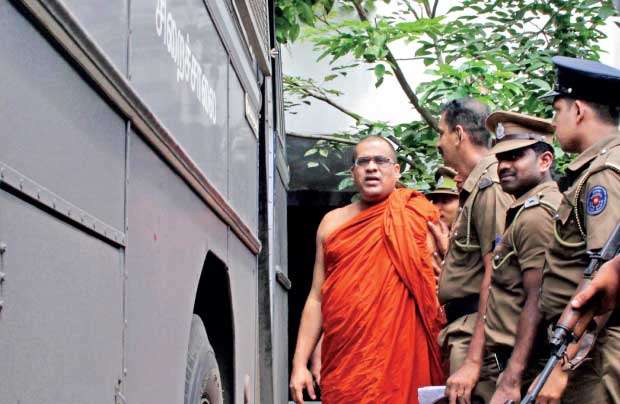
Two very recent court decisions deserve attention. One is the prison sentence imposed on Galabodaaththe Gnanasara Thera for criminally threatening a litigant who had sought recourse through courts to find her missing husband, a veteran journalist. The second involves the granting of Rs.400,000 by the Supreme Court, as the cost of appeal to the wife of a smoker who died of lung cancer. The first shows that, after all, the rule of law applies to all without distinction while the second is vital in terms of the scope of litigation that it opens up for future litigants as well as the judicial recognition that legal procedures are being used or misused by the able to delay and deny justice.
 2018-06-27
2018-06-27The judgement of the Homagama Magistrate on the abusive and law-breaking bikkhu, is commendable, in the least, in a country where it is felt that those in places of authority whether political, business or religious, are beyond the arm of the law. We have seen the awkwardness of the law courts in merely serving summons on robe-wearers; this is in addition to the seemingly untouchable status of personnel of the three security forces.
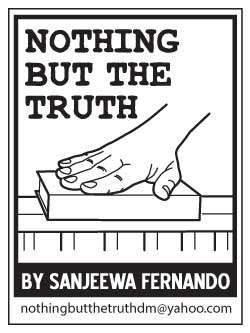 The
general public, though not experts in the law or legal concepts are
intuitively aware about what is right and just. That is why in a jury
trial, the jury consists of ordinary people with some kind of basic
background, but without any specific legal credentials. That is one
instance where conscience and commonsense is deemed better than in-depth
knowledge of the law in seeing what is just and fair .
The
general public, though not experts in the law or legal concepts are
intuitively aware about what is right and just. That is why in a jury
trial, the jury consists of ordinary people with some kind of basic
background, but without any specific legal credentials. That is one
instance where conscience and commonsense is deemed better than in-depth
knowledge of the law in seeing what is just and fair . Lord Denning, perhaps the most brilliant legal luminary of our times, said the need was not for judges with extraordinary knowledge of the law, but with an understanding of what justice and fairness are. What wisdom from that great mind. In fact it is judges of that particular quality that modern society needs in earnest; when it comes to countries like ours, the need is felt that much more acutely.
Judiciary as the weakling?
Some say that the Judiciary is the weakest branch of the state viz a viz the executive and the legislative. I disagree. The judiciary might lack the military might of the executive or the popular clout of the legislature, yet it has the respect and deference of the general public; the power to persuade, inspire, mobilize the masses not in the manner politicians do, but in a silent, gradual and steady way. We call it soft power.
Soft power is gaining prominence even in affairs of State and international diplomacy. In the same vein, the soft power of the judiciary is second to none. Judgements by courts which the public embrace as reasonable, just and brave, go a long way in building up the image of the judiciary to a large extent.
There is a common belief that the law courts are a place where any damn fib could be adorned as truth while even a biblical truth is undermined if one has the means to have the best counsel around. Instances of such notorious ingenuity of lawyers using technical grounds to win cases, most of the time letting loose murderers on hair splitting arguments are now folklore in showing how far from each other law and justice in fact are.
Disillusioned with Law
The growing disillusionment with state institutions such as the Police, Law Courts, Public Offices does not augur well for democracy or a civilized society in general. When the common man realizes that what he reverently submits to as the ‘supreme Law’ does not apply to the high and the mighty, he will take the law into his own hands. Thus, is born the ‘lynch mob’.
The hue and cry generated in the backdrop of the errant bhikku being clad in a prison jumper is not only frivolous but tainted with extreme bigotry
The Executive and the Legislative arms of the State have lost credibility and enjoy very little soft power in the eyes of the public. But that is exactly where the judiciary holds the upper hand; in being able to retain the confidence of the public and in turn, to convince them that abiding by law, is not merely to avoid penal repercussions, but more so to benefit them making life more safe, benign and wholesome as human beings. When a very senior judge saluted with reverence the wife of the Police Security Officer who died in the line of duty, we saw the awe inspired in the society for that act of humility and benevolence of a powerful state functionary.
The hue and cry generated in the backdrop of the errant bhikku being clad in a prison jumper is not only frivolous but tainted with extreme bigotry. To start with he is not the first monk (or member of the clergy ) in a prison jumper because fifteen of them, it is said, had faced the same predicament and we had not heard any grumbling at all. Secondly, where were the monks up the hierarchy, pleading clemency for this delinquent in saffron robe when he ran amok like a rabid dog, biting all and sundry.
Thalduwe Somarama and Buddharakkhitha as well as Matthew Pieris, did time in the Government Boarding wearing what other prisoners wore. That is justice. Even if one concedes that Law and Justice do not overlap each other perfectly, we need the law to be applied generally, universally and without distinction.
The growing disillusionment with state institutions such as the Police, Law Courts, Public Offices does not augur well for democracy or a civilized society in generalThe second case was the one where the Supreme Court made an order, on a Special Leave to Appeal made by Ceylon Tobacco Company in a case filed by a person who died of lung cancer after being a long time smoker. The Order was of a preliminary nature and not final, yet the Supreme Court recognized the fact that legal procedures such as right to appeal can be used by the economically stronger parties to frustrate the very just and legitimate claims of those who are not wealthy. An eye opener for many judicial officers who seem to think that the law in the abstract is all that matters.
A chequered history
The Judiciary of this country has a chequered history; yet though bent, it is not broken entirely. It is often pressured but has not perished. It has in its ranks those individuals, who are ready and brave enough to uphold the law and more important, with justice and fairness, which is the strongest thread that can hold together a fast disintegrating societal structure. They speak out with their decisions that justice should be the hallmark of sound law and secondly that the law should apply equally to all irrespective of their civil status, economic prowess or any other extraneous criteria.
At the same time we need those judicial decisions penalizing culprits to be enforced and not confined to paper decrees. Right of appeal as well as the presidential pardon under the Constitution should not be allowed to frustrate the long arm of the law reaching the high and mighty and the ordinary alike.
After all, judicial power, too, is an extension of the sovereign power of the people according to Article 3 of the Constitution. If the people decide otherwise, then the Bench too will come crashing down.
One nation – divided country; diverse nationalities – one country
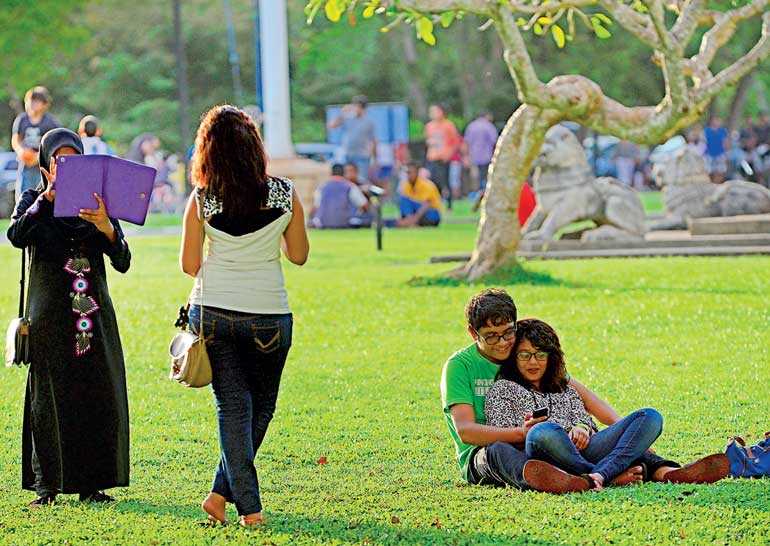
A garden is not beautiful when it has flowers of the same colour. It will be beautiful when it is filled with a multitude of diverse flowers with different colours and fragrance. With the interaction between different nationalities great art, literature, architecture, engineering marvels will blossom. A land where people of different nationalities live with mutual respect and trust will emerge. It is the task of us who are living today to make that renaissance happen in the future – Pic by Shehan Gunasekara
 Wednesday, 27 June 2018
Wednesday, 27 June 2018The only foundation, the definitive purpose and the eternal principle of Sri Lanka’s future development must be “to preserve the land we call Sri Lanka with all its living and non-living resources for the Sinhala, Tamil, Muslim, Malay, Burgher children of the future, and their children; and theirs, in a state better than what it is of today”. These words were mindfully written by me for the speech I delivered at the Viyathmaga Convention 2018.
Its apparent meaning is that we should live today without destroying the resources of this land in order to secure the ability for the future generations to enjoy them. I will write about this in detail in the future. But there is another deeper meaning which I’m trying to convey through the above statement. It is to propose a future-proof solution to our national identity crisis. This article is that supplement.
The land and its name
 This
land has been called by different names in the past. Sihaladiva, Lanka,
Thaprobane, Serendib, Sinhale, Eelam, Ceylon were names used by
different people at different times. As written in the Kandyan
Convention, it was the “Sinhale” kingdom which was betrayed to the
British Empire in 1815 by the short-sighted aristocrats of the time. For
the next 133 years this land was to be called “Ceylon” by the imperial
British colonisers.
This
land has been called by different names in the past. Sihaladiva, Lanka,
Thaprobane, Serendib, Sinhale, Eelam, Ceylon were names used by
different people at different times. As written in the Kandyan
Convention, it was the “Sinhale” kingdom which was betrayed to the
British Empire in 1815 by the short-sighted aristocrats of the time. For
the next 133 years this land was to be called “Ceylon” by the imperial
British colonisers.“Sri Lanka” is the short form of the present-day name of this land. According to the legendary epics of Ravana, “LankaPura” was his capital city. Although it is debatable why, when and how the name “Lanka” was used to call this land, there is evidence to believe our ancestors used it throughout the history. It is by the 1972 Constitution, that name once again gains its official binding to this land which we now call the “Democratic Socialist Republic of Sri Lanka”.
The one letter Sinhala prefix “shri” (etym. Sanskrit, pronounced as ʃri or Shree) was written as “Sri” by those who wrote the original constitution. That’s probably why some foreigners call it “Siri Lanka”. Some old enterprises still use “Ceylon” in their brand name. Bank of Ceylon is called as “Lanka Bankuva” in Sinhala, and Ceylon Petroleum Corporation is called as “Lanka Khanija Thel Neethigatha Sansthava”.
Tamils often call this land as “Elankey”. Americans, Australians and the Lankans who lived a year or two in the US or Australia call it “Shri Laanka”. Tweeps use #lka. What I’m trying to say is that the nomenclature used to refer to this land is never consistent or permanent. It will certainly change in the future as it did in the past.
Race, race and race
The Sinhala and Tamil word “Jaathiya” is the common word used to express race, ethnicity and nationality interchangeably. Although we can talk about these nuanced constructs in length, the purpose of this article is not such. For the ease of understanding let me simplify them.
The concept of “Race” is a complicated, highly debatable, biological and sociological classification. “Ethnicity” is a human-social-religious-cultural-historical classification. “Nationality” is a state-legal classification. However, “Jaathiya” by its original meaning of “birth” conflated with its simplistic meaning of “types” has become a convenient and controversial term used for all above constructs.
It would be a wonderful scientific experiment to analyse the genotypes and phenotypes of the Sinhala, Tamil, Muslim, Malay, Burgher and other many different races who are born, migrating and dying in this land. But as someone who holds a Degree in Genetics, I doubt it will solve the national identity crisis in Sri Lanka.
In this context, “Jaathiya” is more closer to the concept of “ethnicity” (Janavargaya), i.e. A large enough population that demonstrates similar behaviour in language, social norms and values, religious beliefs and rituals, traditions, customs and exclusions, art, culinary, fashion, sports and games, dances and celebrations; and similar thought patterns driving those behaviours can be identified as one “Jaathiya”.
It may or may not have a biological basis. However, because the primary reason for the propagation of identity is being “born” to that “Jaathiya”; and many of the above characteristics are passed from generation-to-generation, it is reasonable to call it “Jaathiya”.
Jaathiya and nationality
Whether for scientific reasons or for philosophical reasons, saying there is no such thing as “Jaathiya” is to be ignorant. There is a clearly identifiable population called the Sinhala Jaathiya. There is a clearly identifiable population called the Tamil Jaathiya. There is a clearly identifiable population called as the Muslim Jaathiya. Even with smaller numbers the Malay Jaathiya and Burgher Jaathiya can be clearly identified.
That is because each of those populations demonstrates unique human-social-religious-cultural-historical characteristics different from one another. They are complicated characterises which evolved in the past, evolving in the present and will continue to evolve in the future. It is those characteristics which are experienced and expressed by the people of those Jaathika or national identities. He or she who does not accept such identities of others is either a fool; or a nihilist or an opportunist with a hidden agenda.
In addition, calling there is only one “Sri Lankan” Jaathiya or nation or nationality is extremely ridiculous. There is no identifiable identity whether as Jaathiya or race or ethnicity or nationality called “Sri Lankan”. Not here, not anywhere.
The attempts to disavow the identities of the Sinhala, Tamil, Muslim, Malay, Burgher; and forcing them into an artificial, non-existent, unnatural “Sri Lankan” national identity is a violation of their human-social-religious-cultural-historical rights. In fact, it is a soft national massacre. This is where Sri Lanka’s national identity crisis is at in the 21st century.
Nation-state and republic contradiction
Some countries have “nation-states” which were created by the vast majority of a single race or ethnic population thereby making them a nationality. Germany, Egypt and Bangladesh and many more are nation-states.
Until 1815 there must have been a nation-state in this land. The majority of Sinhala people accepted the Sinhale Kingdom until then. But thereafter for 133 years this land was a colony of the British Empire. And when we received this land back from the British in 1948, we did not get what we gave up originally. There is little value in debating about that choice which was taken by the British and the local aristocrats of the time.
There were and there died Sinhala, Tamil, Muslim, Malay and Burgher people in the fight for independence. The local and foreign circumstantial contingencies were complex at the time. Nevertheless, when this land became fully independent in 1972, it definitely became a democratic socialist republic, a land of the people, ruled by the people, for the people. That, I think is the greatest achievement of our civilisation in the 20th century.
But it no longer was a “nation-state”. There is no one nationality anymore. This land and all its resources truly and irrevocably belongs equally to the different nationalities of Sinhala, Tamil, Muslim, Malay, Burgher.
Equal rights for different nationalities
Therefore, it is wrong to call Sri Lanka as one nation with one Sri Lankan nationality or Jaathiya. You can’t change the Jaathika identity of a population every time the name of the land changes. It’s a far worse mistake than the 1956 Sinhala language policy.
Conflict between races, ethnicities or nationalities occur when their identities are challenged. “Identity” is the root cause of the 30 year long internal war which exploded on the issue of language. In the Republic of Sri Lanka live different nationalities of Sinhala, Tamil, Muslim, Malay, Burgher with equal rights and responsibilities.
If you prefer Sinhala identity, for it you have the fullest freedom. If you prefer Tamil identity, for it you have the fullest freedom. If you prefer Muslim identity, for it you have the fullest freedom. If you prefer Malay identity, for it you have the fullest freedom. If you prefer Burgher identity, for it you have the fullest freedom. If you prefer no identity, for it too you have the fullest freedom.
Any other “national” has the freedom to legally become a citizen of this country and live as their preferred national identity. In a country where citizens are born free with the absolute sovereign rights to this land, the government has no right to force us into any one or more nationality. The people’s representatives who are trying to do that must be rejected at full. This highly important clarification must be amended to the constitution.
You might be wondering then what you should write under “Nationality” when filling print and digital forms. Because we are not a “nation-state” it is wrong to write as “Sri Lankan”. We should correctly write our national identity “Sinhala”, “Tamil”, “Muslim”, “Malay”, “Burgher”, “British”, “American”, or “None”.
Accordingly, “National Flag” should be changed to “State Flag”, and “National Anthem” to “State Anthem”. It will remove the “Jaathika” affiliation with these state symbols. Government bodies which have the word “National” in their name should be changed to “State” (Raajya).
But let’s not confuse this with “citizenship” which is merely a legal convention to identify the geographic location of a person. Therefore, it is correct to write as “Sri Lankan” under the label of citizenship. Besides, people change their citizenship when they migrate. But evidently change of citizenship hardly changes one’s sense of national identity.
Children of the future
A country where different and diverse nationalities live with equal rights has a mature society. In such a country the competition between nationalities will weaken. When your identity is not challenged in any way, why would there be any competition? Then we can stop the insincere reconciliation political tactics.
As the old racist political actors succumb to their age in the next 10-20 years, the golden age of the “Democratic Socialist Republic of Sri Lanka” will begin. In that future, the Sinhala, Tamil, Muslim, Malay, Burgher will not only protect their own nationalities but will protect the others’. Only then we will see a mature “Democracy” beyond the barriers of identity politics.
A garden is not beautiful when it has flowers of the same colour. It will be beautiful when it is filled with a multitude of diverse flowers with different colours and fragrance. With the interaction between different nationalities great art, literature, architecture, engineering marvels will blossom. A land where people of different nationalities live with mutual respect and trust will emerge. It is the task of us who are living today to make that renaissance happen in the future.
(The writer is a Social Entrepreneur and Ambassador for Democracy Earth.)
CEB Superintendent invents shoes to safely negotiate concrete, wooden posts
An Electrical Superintendent has made a pair of iron shoes that could be
used to safely and quickly climb concrete and wooden lamp posts.
The inventor of this pair of iron shoes is Electrical Superintendent Nihal Samarakone attached to the Hatton Electricity Consumer Centre.
Speaking to the Daily News, Samarakone said currently Ceylon Electricity Board (CEB) workers use ladders to access power lines, which is a hassle to transport and is also dangerous.
He added that a worker could climb a post at the same speed of walking with the help of these shoes
“There are certain places where it is hard to transport a ladder which would also require several persons to carry it. On the contrary, this new invention weights a mere kilogramme and it also offers safety for the CEB worker, while allowing him greater access to work comfortably for longer periods.
A worker has to stand on the ladder and this sometimes causes numbness in his legs. This also limits the time he can stand on the ladder. However, this new device makes it easier on his feet and prevents such difficulties,” Samarakone said.
He said measures have been taken to apply for a patent for this new invention. Samarakone also has around 30-40 other patents for various inventions.
His latest product is the only patent obtained for a food substance which is sold under the brand name ‘Sarva Posha’. It is a cereal produced using the pulses and grains, especially indigenous rice varieties that have proven health benefits. “These grains are not simply used and we extract the highest nutritional values using the maximum energy methods and this cereal is an excellent source of nutrition,” he added.
The inventor of this pair of iron shoes is Electrical Superintendent Nihal Samarakone attached to the Hatton Electricity Consumer Centre.
Speaking to the Daily News, Samarakone said currently Ceylon Electricity Board (CEB) workers use ladders to access power lines, which is a hassle to transport and is also dangerous.
He added that a worker could climb a post at the same speed of walking with the help of these shoes
“There are certain places where it is hard to transport a ladder which would also require several persons to carry it. On the contrary, this new invention weights a mere kilogramme and it also offers safety for the CEB worker, while allowing him greater access to work comfortably for longer periods.
A worker has to stand on the ladder and this sometimes causes numbness in his legs. This also limits the time he can stand on the ladder. However, this new device makes it easier on his feet and prevents such difficulties,” Samarakone said.
He said measures have been taken to apply for a patent for this new invention. Samarakone also has around 30-40 other patents for various inventions.
His latest product is the only patent obtained for a food substance which is sold under the brand name ‘Sarva Posha’. It is a cereal produced using the pulses and grains, especially indigenous rice varieties that have proven health benefits. “These grains are not simply used and we extract the highest nutritional values using the maximum energy methods and this cereal is an excellent source of nutrition,” he added.
How China Got Sri Lanka to Cough Up a Port
CHINESE COMPANY GAVE MAHINDA US$7.6 MILLION FOR ELECTION CAMPAIGN – NEW YORK TIMES

A cargo ship navigating one of the world’s busiest shipping lanes, near Hambantota, Sri Lanka, in May.
CreditAdam Dean for The New York Times
By Maria Abi-Habib-June 25, 2018
HAMBANTOTA, Sri Lanka — Every time Sri Lanka’s president, Mahinda
Rajapaksa, turned to his Chinese allies for loans and assistance with an
ambitious port project, the answer was yes.
Yes, though feasibility studies said the port wouldn’t work. Yes, though
other frequent lenders like India had refused. Yes, though Sri Lanka’s
debt was ballooning rapidly under Mr. Rajapaksa.
Over years of construction and renegotiation with China Harbor
Engineering Company, one of Beijing’s largest state-owned enterprises,
the Hambantota Port Development Project distinguished itself mostly by
failing, as predicted. With tens of thousands of ships passing by along
one of the world’s busiest shipping lanes, the port drew only 34 ships
in 2012.
And then the port became China’s.
Mr. Rajapaksa was voted out of office in 2015, but Sri Lanka’s new
government struggled to make payments on the debt he had taken on. Under
heavy pressure and after months of negotiations with the Chinese, the
government handed over the port and 15,000 acres of land around it for 99 years in December.
The transfer gave China control of territory just a few hundred miles
off the shores of a rival, India, and a strategic foothold along a
critical commercial and military waterway.

Note: China provided only partial financing for some ports. | Sources:
Construction Intelligence Center; Johns Hopkins University School of
Advanced International Studies; Center for Strategic and International
Studies; New York Times reporting.
By The New York Times
The case is one of the most vivid examples of China’s ambitious use of
loans and aid to gain influence around the world — and of its
willingness to play hardball to collect.
The debt deal also intensified some of the harshest accusations about
President Xi Jinping’s signature Belt and Road Initiative: that the
global investment and lending program amounts to a debt trap for
vulnerable countries around the world, fueling corruption and autocratic
behavior in struggling democracies.

Former President Mahinda Rajapaksa of Sri Lanka, center, holding court at a wedding in Colombo in June.CreditAdam Dean for The New York Times
Months of interviews with Sri Lankan,
Indian, Chinese and Western officials and analysis of documents and
agreements stemming from the port project present a stark illustration
of how China and the companies under its control ensured their interests
in a small country hungry for financing.
Read More
NEVER-ENDING DILEMMAS!!!
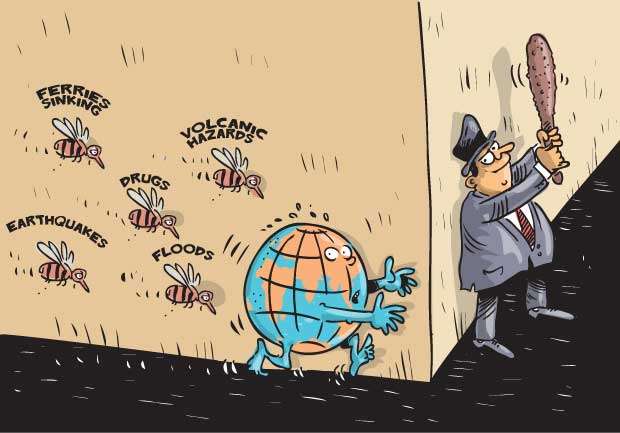

2018-06-27
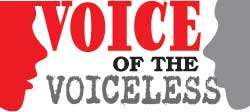 Today,
we live in a world on the brink of annihilation. A ‘world gone mad’
with power-hungry people, disasters both natural and augmented, ferries
sinking, volcanic hazards, floods, earthquakes, drugs, flights catching
fire or airplanes going down, and additionally a record of 68.5 million
people displaced worldwide. In a society governed passively by free
markets and free elections, organised greed always defeats disorganised
democracy!
Today,
we live in a world on the brink of annihilation. A ‘world gone mad’
with power-hungry people, disasters both natural and augmented, ferries
sinking, volcanic hazards, floods, earthquakes, drugs, flights catching
fire or airplanes going down, and additionally a record of 68.5 million
people displaced worldwide. In a society governed passively by free
markets and free elections, organised greed always defeats disorganised
democracy! 
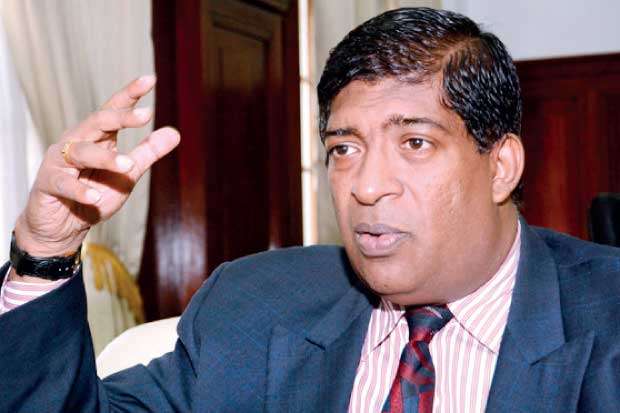
We finally hear that a Corruption High Court opens on July 15!!! Apparently, this has accounted for long delays in the resolution of court cases; the main obstacle towards ensuring good governance. Money laundering, bribery, huge financial crimes, misappropriation of property, criminal breach of trust by public servants, with the FCID receiving 335 cases, of which only 99 have been investigated and held over for due process!!! The Avant Garde revised application due to come up only on July 2!!! Promise of the Bond report!!! AGAIN WE ASK, WHY SUCH A HUGE TIME LAPSE??? The nigger in the woodpile, Ravi K is apparently complaining that he cannot get into Parliament without interference!!! So he asks, “IS THIS DEMOCRACY???” WE WERE GIVEN POWER TO RESTORE THE COUNTRY, NOT TO BE SHUT OUT BY PEOPLE HOLDING BOARDS!!! SO, WE ASK, DID THIS GOVERNMENT RESTORE DEMOCRACY??? MORE LIKELY HYPOCRISY WITH THE LIKES OF HIM!!!

It has taken a foreign envoy, the German Ambassador to say the government should implement the agenda on which it was elected to office in 2015!!! No one could have made a more explicit statement!!! Doesn’t the government still realise that the true measure of all our actions is how long the good in them lasts??? The sad truth is they have not done ANY GOOD SO THEIR MISDEMEANOURS AND UNTRUTHS ARE WHAT WILL OUTLAST THEM!!!

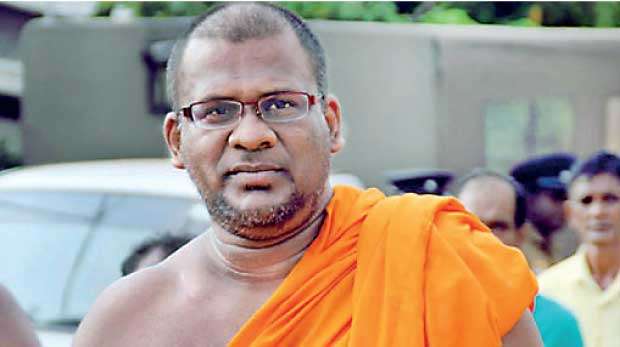
The ongoing verbal battle is about the ‘Prison Jumper’ the Buddhist monk is expected to wear!!! Before this too there were religious leaders (14 of them behind bars) who wore prison jumpers, but no one spoke of them! Why has only the BBS been singled out? What about the yellow-robed ones who wear trousers at night to creep into night clubs, where prostitutes are made available to them? Is that better than wearing the prison jumper??? Why is no one talking about those happenings??? Is that behaviour accepted under the precepts of Buddhism??? THERE IS SO MUCH THAT BUDDHISM DOES NOT ALLOW BUT WHICH IS HAPPENING NONETHELESS!!!

The next election is targeted for 2020!!! We wonder if by then the poor will find a way to live as they can hardly make ends meet now!!! We hear that in India, politicians are being chased with slippers!!! The way things are progressing in our country, it is likely that we should also get ready for that!!! Targeted elections mean nothing to them; you see our President going to sleep at 10 o’clock!!! He is such a lucky guy as there is nothing to keep him awake; absolutely nothing to worry about. After all, everything in the country is fine!!! Our President says he gleans knowledge of what is happening in the country by reading newspapers!!! Therefore, from 10 o’clock at night until he wakes up in the morning, nothing is happening OR even if things do happen, they are of no significance??? Even if the gravity of anything dawns on this nitwit, he most probably goes “AIYO! DID THIS REALLY HAPPEN??? HOW COME I DID NOT KNOW ABOUT IT???” LITTLE DOES HE REALISE THAT THE VOTER MIGHT PUT HIM TO SLEEP ALTOGETHER ONE OF THESE DAYS, UNLESS HE STOPS SLEEPING AND STARTS LISTENING TO WHAT THE PEOPLE SAY!!! The poor man in this country CANNOT SLEEP!!! He has so many burdens, so much to worry about, so many problems to which he cannot find solutions, so NO SLEEP, NO PEACE OF MIND TO SLEEP!!!

THE POOR MAN’S MAJOR PROBLEM IS SCHOOLING HIS CHILDREN. HE CANNOT! HE JUST CANNOT FIND THE MONEY TO GET HIS CHILD EVEN INTO GRADE 1!!! This column has repeatedly talked about this deadlock situation where parents are helpless but NOTHING HAPPENS!!! We should send our erstwhile educated one to Finland Montessori to get himself a good education, perhaps he will then understand the value of a good education and the burden poor parents in this country have to cope with!!! Now they are talking about a medical insurance of Rs.200,000 per child – ONLY TALKING, NOTHING DONE!!! Pragmatically speaking, how can people, especially ministers who have no children, understand the gravity of not being able to admit their children to school???

Children face huge problems because of their parents – they feel unloved, unwanted!!! I read that one child whose mother was a teacher was correcting test papers and she was crying while doing so. When her husband questioned her, she said it was their son’s paper and in it he sorrowfully explains how neither of his parents has time for him, to even talk or to play with him, because their lives are governed by smart phones!!!
Our President says he gleans knowledge of what is happening in the country by reading newspapers!!! Therefore, from 10 o’clock at night until he wakes up in the morning, nothing is happening OR even if things do happen, they are of no significance???
Because this little boy had the courage to speak out, he was able to regain the love of his parents!!! Sadly, how many children go through this terrible trauma today not being able to talk to their parents??? THE ADVANCEMENT OF TECHNOLOGY HAS BEEN TO THE DETRIMENT OF MANKIND, ESPECIALLY OUR CHILDREN!!!

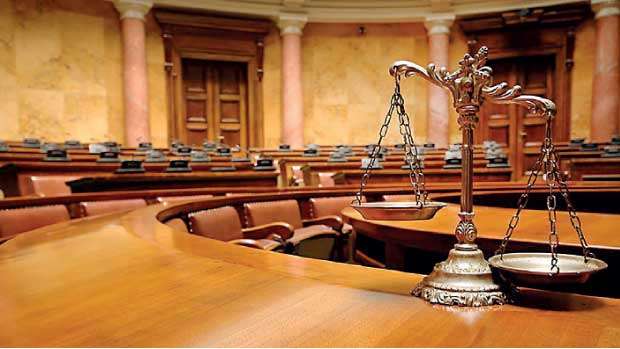
There is yet another aspect of humanity I would like to dwell on. Apparently, a trial was held in New York, on a cold January night; an old tattered looking lady was being tried for stealing a loaf of bread. She looked ashamed when the mayor asked if she stole the loaf of bread!!! She lowered her head and said, “That’s right Your Honour, I did steal the loaf of bread.” He then questioned her motive; asked if she was hungry. She said she was famished but that it was not for her that she stole the bread but for the two children of her sick daughter, who had not eaten for days! The judge then told her everyone was equal before the law and she could choose to either pay a fine of $10 or go to jail. She opted to go to jail as she did not have a single penny!!! The judge then took money out of his pocket and paid her fine!!! Additionally, he ordered the bailiff to collect -/50cts from everyone in court and give it to the poor lady. He said no old lady should have to steal a loaf of bread! COULD SUCH A HUMANE ACT HAVE HAPPENED IN OUR COUNTRY??? “Cataract is the third biggest cause of blindness; religion and politics remain the first two.”
My bête noire, Gnanasara
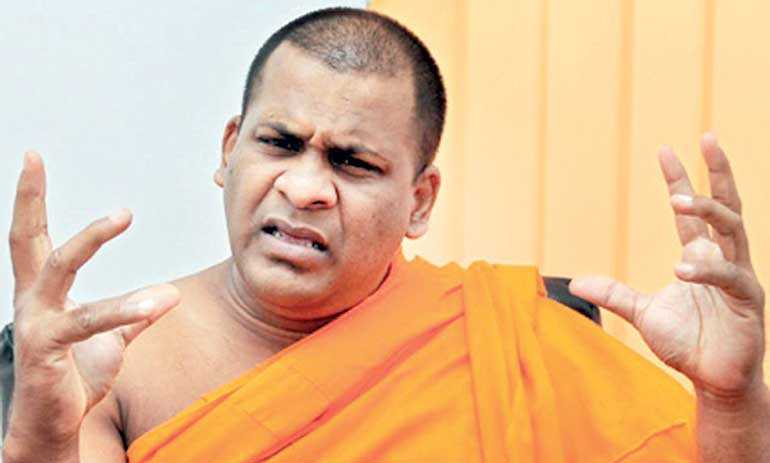
 Thursday, 28 June 2018
Thursday, 28 June 2018When it comes to the likes of pseudo religious figures viz, Gnanasara, I refuse to dignify such with revered titles; ‘Thera’, ‘Reverend’ or ‘Venerable’ as others do. To do so, would be a downright insult to all those who are genuinely worthy of it.
As a Sri Lankan, a Buddhist and a Sinhalese, I find this man utterly and completely reprehensible, offensive, an acute source of embarrassment and an irritation; in short, disgusting!
This ‘monk’ has, singlehandedly denigrated the image of the few authentic and revered Buddhist monks of Sri Lanka, both past and present, and turned the mantra “Sri Lanka is a Buddhist country” into a joke.
 Shaving
one’s head and donning a saffron robe does not make one a Buddhist
monk. Any Tom, Dick and Harry can do that and call himself Ven. Bla Bla
Bla Thero. This man is nothing but a charlatan in robes and desecrating
it in every way possible.
Shaving
one’s head and donning a saffron robe does not make one a Buddhist
monk. Any Tom, Dick and Harry can do that and call himself Ven. Bla Bla
Bla Thero. This man is nothing but a charlatan in robes and desecrating
it in every way possible.His foster political parents; demagogues of a bygone era appeared to be enchanted by this ageing puppet’s performances back then, and seemingly gave succour to it with impunity by simply looking the other way.
The failure on the part of the authorities back then to call a final halt to the appalling behaviour of this flagrant menace and shut him up for good, gave rise to a new breed of Gnanasara ‹s ilk. Intoxicated by his performances, they developed Dutch courage, took the law into their own hands and ran amok. I predicted this over five years ago in one of my ‹Opinion› pieces, ‹Courting Satan in Saffron Robes› when Gnanasara of the Bodu Bala Sena (BBS) first raised his ugly head!
Then, with the political regime change in 2015 the man appeared to have been subdued but, the relief for us was short-lived. The Homagama High Court drama made him erupt like a volcano and got him landed behind bars. This is where the likes of him rightfully belong, for the rest of their lives. Alas, the relief for us was short-lived, again.
Upon being bailed out back then, he had to open his gab yet again and thrash all hope of him having reformed, despite being incarcerated like a common criminal. This man has no shame!
Reportedly, his public announcement upon being released was, on the need to educate Buddhist monks on the laws governing this country!!!
By this, was this man implying that pseudo monks like him behave the way they do, as they have no understanding of the laws of this land???
Before his volte-farce on the laws of the land and his seemingly newfound respect for it, Gnanasara is on record for stating that they of the Bodu Bala Sena (BBS) would not subject themselves to the Roman Dutch law, which he deemed as ‘suddhage neethiya’ (white man’s law), and would only abide by the law of the Dhamma.
Laws of the Dhamma!!! Does he even know what they are???
Was his performance within the Homagama High Court premises, running riot and hurling invective at the wife of journalist Prageeth Ekneligoda, and insulting the court and court officials which ultimately landed him behind bars, his idea of the “law of the Dhamma”?
Has he even heard of the Tripitaka let alone the Vinaya Pitaka; the monastic rules Buddhist monks are required to abide by?
Then he went on to publicly request the Mahanayake Theras (who themselves violate the Vinaya Pitaka with impunity by upholding the repugnant caste system denounced by the Buddha) and the ‹white elephant› Buddha Sasana Ministry, to include a course on the prevailing law enforcement system in the country, at the end of the Pirivena education or, in the Bachelor of Arts (BA) or Master of Arts (MA) courses, at the end of any Buddhist education in the country.
To call this man a clown, is a compliment to him and, he›s well advised that it’s better to keep his trap shut and be thought a fool than open it and remove all doubt!
According to Chapter II, Article 9 of Sri Lanka›s Constitution, “The Republic of Sri Lanka shall give to Buddhism the foremost place and accordingly, it shall be the duty of the State to protect and foster the Buddha Sasana…”
Is this how the State is giving Buddhism the foremost place, protecting and fostering the Buddha Sasana by seemingly granting carte blanch to the likes of Gnanasara, to make a mockery of it? Is he not openly violating the Constitution of this country? Isn’t this tantamount to an act of treason?
Never mind ignorance of the laws of the land or even the Dhamma, the latter which most label bearing Buddhists don’t have a clue of anyway, isn’t it basic human common sense, decency and etiquette to know how to conduct one’s self, at least within the hallowed precincts of a court house?
The air of defiance and the obvious lack of remorse or shame displayed by this man as he was last bailed out a few days ago only prove, that his theatrics are far from over!!!
In the absence of the Mahanayakes and the State’s seeming inability to have this man disrobed, I ask the ‘legal eagles’ out there, does a citizen of Sri Lanka like myself, have the right in the eyes of the law, to demand him to be disrobed?
Pining for Hitler!
June 26, 2018, 8:59 pm
 Ven.
Endaruwe Upali, Deputy Chief Priest of the Asgiriya Chapter in the
Buddhist ecclesiastical order, is in the news. But it is not for his
knowledge of the Dhamma or for the erudite delivery of a sermon worthy
of Buddhism’s timeless appeal or for his strict adherence to vinaya, the
set of disciplinary rules, which is expected to embellish the moral and
ethical character of the Buddhist clergy. In fact, he is in the news
for all the wrong reasons.
Ven.
Endaruwe Upali, Deputy Chief Priest of the Asgiriya Chapter in the
Buddhist ecclesiastical order, is in the news. But it is not for his
knowledge of the Dhamma or for the erudite delivery of a sermon worthy
of Buddhism’s timeless appeal or for his strict adherence to vinaya, the
set of disciplinary rules, which is expected to embellish the moral and
ethical character of the Buddhist clergy. In fact, he is in the news
for all the wrong reasons.
At an offering of alms to mark the 69th birthday of Gotabhaya Rajapaksa a
few days ago at his residence in Mirihana and in the presence of many
luminaries supportive of Rajapaksa’s presidential ambitions, the monk
had observed in a sermon, "as the clergy, we feel the country needs a
religious leader … Some people have described you as a Hitler. Be a
Hitler. Go with the military and take the leadership of this country."
The news has been reported slightly differently in different news
portals. Even so, the basic thrust of the Reverend’s argument is what I
have quoted above. Today, I will not deal with Rajapaksa’s presidential
campaign or his suitability for the country’s top job. My interest is
merely with the Hitlerite analogy or metaphor the monk had drawn in
blessing Rajapaksa and his politics. And this has been done by no
ordinary man off the street. He is one of the most high-ranking members
of the country’s Buddhist clergy. And the primary example he used in his
sermon is not merely any man lost to the mists of history, but the
architect of the Jewish holocaust, which killed six million Jews as part
of his depraved ‘final solution.’
As I grew up, my parents and teachers in school did not ever bring up
the character of Hitler as something that we should emulate, but as the
ultimate example of pure evil no one should contemplate even in one’s
worst nightmare. In the 1980s, in the midst of graduate studies, I
remember buying Hitler’s Mein Kampf for US$ 1.00 and bringing it to
Colombo in the mid 1980s on a rare vacation. Both my parents reprimanded
me for reading such ‘dangerous’ stuff, and admonished me not to leave
the book lying around. That was because a somewhat politically unhinged
neighbour had been accosting me regularly those days to try and borrow
the book to translate it into Sinhala. He thought Hitler’s ‘final
solution’ had much to contribute to Sri Lankan politics with regard to
what he called the ‘Tamil problem.’
My parents were very clearly wary of even Hiltler’s book. And they were
Buddhist too, and it is that Buddhism I have also inherited along with
my sister and many others in my generation. In that Buddhism, Hitler’s
only place even as a mere cursory example of evil would be right next to
Deva Datta, the Buddhist version of Judas. But none of these anxieties
seem to have mattered to Ven. Upali as he delivered his sermon and so
freely used the example of Hitler to make one of his most important
arguments. Though there is much debate on this matter in the social
media and mainstream media, too, there is pronounced silence on the part
of most luminaries including former President Mahinda Rajapaksa and
former Minster GL Peiris and many others who attended the function.
Perhaps, Hitler and what he represents are good for their politics, as
Ven Upali has advised. But today, my focus is not on their politics, but
on Ven. Upali’s statement itself and its location within a Buddhist
sensibility. How is it possible for a man of the Dhamma to prop up the
example of Adolf Hilter in a public utterance, as the ideal an aspiring
local presidential hopeful should emulate?
At one level, Ven. Upali is a mere follower of a dangerous, simplistic
and reductionist streak of global politics that admires strong men. It
is this trend which marked the electoral successes of India’s Narendra
Modi, Russia’s Vladimir Putin and US Donald Trump. Large swaths of
people in these countries and elsewhere have been willing to overlook
blatant failures (to put it mildly) of such leaders for the alleged
purpose of ‘getting things done.’ In this scheme of thinking,
dictatorship is preferred to democracy irrespective of its long-term
social and political consequences. The issue for me is not about
ordinary people’s preference of politics even if these preferences might
be dubious. But when a highly placed priest makes public statements of
political choice and direction, they acquire special attention, meaning
and power. They have the ability to sway people, and that too in a
dangerous direction.
However, given the fallout of his words, a number of public defenses
have already been mounted, which themselves shed considerable light on
the nature of this country’s public politics than anything else. Ven.
Upali himself has issued a formal statement in which he has defended
himself on two grounds:
1) He suggested that one or two words like ‘Hitler’ and ‘military’ out
of a sermon of 30 minutes couldn’t be taken out of context and used to
twist what he said. But as I have said earlier, words such as Hitler in
particular cannot have any positive meaning within the discourse of
world history of the modern period in which it is located.
2) He further noted that "what he meant was that direct policies are
necessary to govern a country and that he did not mean a brutal regime
by killing people like that of Hitler’s" But if Hitler was his reference
and exemplar of ‘direct policies,’ such policies only led to very
specific outcomes all of which are well-documented: the Third Reich’s
attempted hegemony of the world order and the beginning of World War 2
under Hitler; dismantling of democratic practices and institutions in
Germany and its latter subjugation by the allied powers; and the
attempted extermination of Jews with terrible consequences.
A similar defense of these words have been issued by Parliamentarian
Wimal Weerawansa as well, and the thrust of his argument is to blame
Minister Mangala Smaraweera for his criticism of Rev Upali’s sermon, and
blindly argues (or rather, shouts) that the Reverend’s statement has
been misconstrued. Rev. Iththakande Saddhatissa, in a similar defense
has argued what Rev Upali meant was not for Rajapaksa to kill like
Hitler, but build the country from the chaos it is presently in. But if
Hitler is the example of nation-building, then, we are truly in trouble
as that was a drive to eliminate all he considered inferior races and
political obstacles in his relentless march towards unlimited power for
himself and the Third Reich. Ven Medagoda Abhayatissa outlined a more
insidious argument that goes much beyond the defense of Rev Upali’s
words. According to him, when someone like a Deputy Chief Priest, issues
a statement, it is simply wrong for people to criticize him looking at
minor ‘linguistic’ issues. Hitler, it seems is one of those minor
linguistic issues. He further notes, what Rev Upali meant through the
metaphor of Hitler was for Mr Rajapaksa in his future hoped-for
presidential role to build a law-abiding, disciplined society.
Even a cursory glance at world history would clearly indicate the kind
of havoc Hitler’s sense of ‘discipline’ ushered in, not only in Germany,
but also in the entire world. Gas chambers in Auschwitz and elsewhere
in Europe, which killed millions of Jews are the direct results of this
‘discipline.’ There is also a strong undercurrent in his words, which
suggests that when statements like this are made by eminent monks, they
should not be criticized by lesser mortals. This reprimand against
questioning Rev Upali’s statement goes against the strong ethical
principles entertaining doubt, dissent and the right to question that
are enshrined in Buddha’s own words in the Kalama Sutra.
In it, the Buddha noted at one point, "when you know for yourselves
that, ‘these qualities are unskillful; these qualities are blameworthy;
these qualities are criticized by the wise; these qualities, when
adopted & carried out, lead to harm & to suffering’ — then you
should abandon them." But clearly, it appears that these words of wisdom
are lost on these recent public peronalities who claim to speak on
behalf of Buddhism. But that is surely not my Buddhism!
What these lay and priestly apologists miss is a very simple but crucial
matter. That is, even in commonsensical conversations, and certainly in
sermons of monks and public statements issued by ‘responsible’ people,
when a word such as Hitler is used pertaining to any context, it cannot
be devoid of all of its obvious and necessary meanings. It is a matter
of history. It is a matter of established systematically culled
knowledge. When such references are made, they cannot be defended on the
basis of latter over-interpretations based on convenience or tenuous
hindsight. Of crucial importance is also the fact that in this country,
people tend to take the advice and words of the clergy very seriously,
and if the examples they offer are problematic, the message itself
becomes a problem, as is the case in this matter. What becomes obvious
in this situation is a fundamental and dangerous ‘lack’ that is so
evident among our pubic personalities -- both priestly and lay. That is,
a woeful lack of commonsense, a nuanced political sensibility and an
abysmal knowledge of the world and its histories and complexities. With
this fundamental intellectual lapse, it is simply too dangerous to take
snippets from that history out of context and to superficially make
local political arguments of dubious value. It is simply irresponsible.
With defenders and friends like these, one really does not need external
enemies to disrupt institutional Buddhism as is often claimed. That
dismantling will come from within, with this kind of thinking, which
goes against the core principles of Buddhist teachings.
More than lay politicians with a questionable track record such as
Weerawansa, my concern is with priests who enter mainstream political
discourse seemingly oblivious of the destructive path they might be in
the process of establishing which negatively impact society in general,
and their own religions order in particular. It is also extremely
disheartening to see their inability to accept a mistake for what it is,
when pointed out. For them, with a great degree of sadness and anxiety,
I can do no better than to offer the Buddha’s powerful words of wisdom
and general reprimand to errant monks, which was expected to be a
deterrent against violations of vinaya:
"It is not fit, foolish man, it is not becoming, it is not proper, it is
unworthy of a recluse, it is not lawful, it ought not to be done. How
could you, foolish man, having gone forth under this Dhamma and
Discipline which are well-taught, [commit such and such offense]?... It
is not, foolish man, for the benefit of un-believers, nor for the
increase in the number of believers, but, foolish man, it is to the
detriment of both unbelievers and believers, and it causes wavering in
some" (The Book of the Discipline, Part I, I.B. Horner; London: Pali
Text Society, 1982, pp. 36-37).
Subscribe to:
Posts (Atom)


